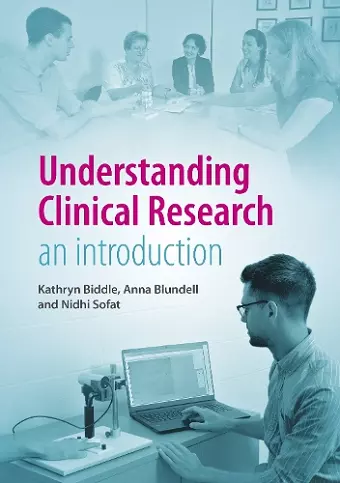Understanding Clinical Research
An introduction
Nidhi Sofat author Kathryn Biddle author Anna Blundell author
Format:Paperback
Publisher:Scion Publishing Ltd
Published:9th May '23
Should be back in stock very soon

A comprehensive guide to clinical research principles, Understanding Clinical Research equips healthcare professionals with essential knowledge and practical examples.
This book provides a comprehensive overview of the fundamental principles of clinical research, featuring a variety of practical examples that illustrate how these principles can be effectively applied in real-world settings. It emphasizes the necessity for healthcare professionals to grasp the essentials of clinical research to enhance their practice and contribute to evidence-based medicine. The content is structured to facilitate understanding, making it an invaluable resource for those new to the field.
Understanding Clinical Research guides readers through the entire research process, starting from formulating research questions, progressing through the design of research studies, and culminating in the dissemination of research findings. Important topics such as ethical considerations, research integrity, patient involvement, and study funding are thoroughly examined. Additionally, the book introduces key statistical methods essential for data analysis, ensuring that readers are well-equipped to tackle the complexities of clinical research.
This book is ideal for healthcare professionals who are keen to deepen their understanding of evidence-based practice, those who wish to embark on research but are uncertain about where to begin, and individuals contemplating or just initiating advanced studies such as a PhD, MD, or PGCert in Research Studies. By addressing these diverse needs, Understanding Clinical Research serves as a vital tool for fostering a robust foundation in clinical research.
Rich methodological insights, a fantastic framework to guide development
‘The book spans a comprehensive overview of quantitative/qualitative research methods and core considerations such as patient/public involvement and ethics. It's great at providing you with a staged approach to learn something new, or delve into something you're familiar with in greater detail. You can tell from the style that the authors have experience of crafting a successful recipe for teaching students. Although it's primarily aimed at medical students, the context is applicable/accessible to any healthcare professional or person with an academic interest.
I liked the structure which enables you to sequentially read the book or dive into a specific area you need more clarity in. Within each chapter there is a good overview including the nuts & bolts of a methodological theory/approach, the research context it could be applied to and a worked example/reference to help you contextualise it. It's very practical.
I'd say if you're very new to research or need instructions on how to conduct detailed tasks e.g. a systematic review using Medline/Embase, you'd get the most out of the book in conjunction with a supervisor/mentor/library service. However, if you read the book without any prior research experience, you'd definitely have a good idea of where to start. Never come across a text with all the information you need to begin your research journey in one place, with an engaging format (diagrams/examples) to walk you through things step-by-step.
A unique and valuable resource for early stage researchers.' Amazon reviewer
Great resource for new or novice clinical researchers
‘This is a much needed book for those who are new to developing clinical research studies and it covers important areas of study design, statistics and other steps needed. The suggestion from the authors that the text is suitable for those undertaking formal post-graduate research training is a good one, but it could be equally used by clinicians or practitioners in health research to give a better understanding of what is needed to do clinical research.
Some of the content is specific to doctors but most would be of use to other professions in this area.
I like the layout of the chapters which are clear and contain figures and illustrations to support the text. There are some 'worked through' examples which show practical application of the topics and bring the contents of what can be quite a complex process to life.' Amazon reviewer
Very Helpful for Medical Students
‘This is a particularly helpful book for medical trainees and students. It breaks down concepts that can be initially daunting or confusing using worked examples.
Explanations are concise and focus on creating a good foundation of understanding of research concepts to then build upon.
Each chapter has a nice summary and further reading suggestions. My only suggestion would be to consider adding in a few questions at the end of the chapter to optional test to help with recall.
I would have found this very useful as a medical student and would recommend it to peers.' Amazon reviewer
Perfect for first time qualitative researchers
‘I was recommended this book by someone as I’d found entry level texts on thematic analysis difficult to follow. This text is by no means basic, but has easy to follow examples and is thorough in its description. I had intended to just dip in to the relevant sections but found myself reading the entire text due to the interesting subject matter. I’ll now be keeping it close by as a handy reference text.' Amazon reviewer
ISBN: 9781914961267
Dimensions: 244mm x 172mm x 10mm
Weight: 498g
200 pages